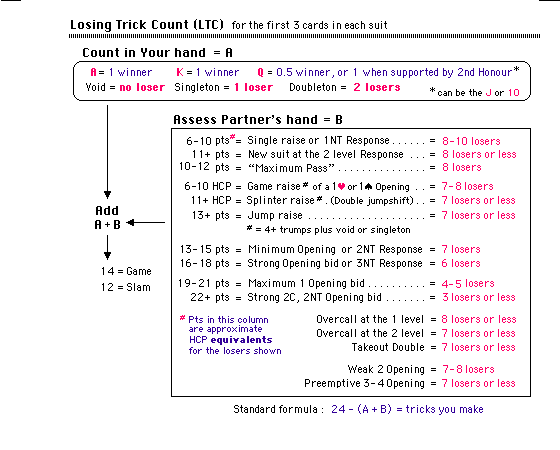|
The Losing Trick Count - Facts sheet
Losing tricks are counted for the first 3 cards in each suit.
Therefore you can have at the most 4 x 3 = 12 losers in your hand and 2 x 12 = 24 losers in the combined hands. (the 13th card is excluded from the count)
Some examples :
♠ K 7 4
♥ Q J 6
♦ J 10 3
♣ K 9 6 2
9 losers
|
♠ 7 4
♥ K 9 7 5 2
♦ A 8 3
♣ Q J 6
8 losers
|
♠ A Q 7 4
♥ 9 5
♦ Q J 8 3
♣ K 8 2
7 losers
|
♠ K Q 4
♥ A Q 5
♦ J 10 8 3
♣ K Q 2
6 losers
|
♠ 9 4
♥ K Q 9 7 6 5
♦ A 10 8 3 2
♣ -
5 losers
|
The actual number of losers in both hands is substracted from 24 (the maximun number of losers possible). This shows the number of tricks you may make :
- 24 losers - 16 losers = 8 winners > Part score likely
- 24 losers - 14 losers = 10 winners > Game is likely
- 24 losers - 12 losers = 12 winners > Small Slam is likely
Counting losers in your hand :
 The Losing Trick Count assesses your hand both in terms of High Card strength and hand shape.
The Losing Trick Count assesses your hand both in terms of High Card strength and hand shape.
More High Card Points > less losers
More unbalanced shape > less losers
|
Bids can therefore usually be made based on your hand's loser count alone !
But in general it is best to look at both points count and losers in your hand.
LTC counts for the common Opening bids and Responses are listed below.
Use them to determine you own bids and to assess the losers in your Partner's hand.
| Opening bid
| Losers
| HCP
Equivalent
| Losers
| Responder's bid
|
| Weak 2 Opening (with 6+card suit)
| 7-8
| 6-10
| 8-9
| Weak response (1NT, Single raise)
1♥ - 2♥ - 3♥ - > Pass = 9, 4♥ = 8 losers
|
| Open with 1 in suit
| 7
| 10-12
| 8
| May bid new suit at the 2 level
Or "Max. Pass" : jump raise Partner's suit,
bid 2NT or bid 5-card suit at 2-level
|
Minimum 1 opening
Pass after a single raise response
| 7
| 13-15
| 7
| Jump raise partner's major
(Ogust 2NT after a Weak 2 Opening)
|
Strong 1 opening
Invite Game after a single raise response
| 6
| 16-18
| 6
| Jump raise partner's major
Consider 4NT if Opener bids to 4 only
|
Maximum 1 opening
Bid Game after a single raise response
| 5
| 19-21
| 5
| Bid Slam or Blackwood
|
| Game forcing 2♣ opening
| 4-3
| 22+
| 4-3
| Bid Slam or Blackwood |
Common
borderline cases :
- With 13+ points regardless of losers : always make an Opening bid
With 12 points and 7 losers : make an Opening bid
With 12 points and 8+ losers : do not open the bidding
- With 11+ points regardless of losers : you may respond with a new suit at the 2-level
With 10 points and 8 losers : you may respond with a new suit at the 2-level
With 10 points and 9+ losers : do not respond with a new suit at the 2-level
Raises of the Opener's suit based on the LTC :
(Losers shown in brackets)
| Opener
| Reponder
| Opener
| Reponder
| LTC
|
| 1♥ (7)
| 2♥ (8-9*)
| Pass
| -
| 7 + 8 = 15
|
| 1♥ (6)
| 2♥ (9)
| 3♥
| Pass
| 6 + 9 = 15
|
| 1♥ (6)
| 2♥ (8)
| 3♥
| 4♥
| 6 + 8 = 14
|
| 1♥ (5)
| 2♥ (8-9)
| 4♥
| -
| 5 + 9 = 14
|
*
A weak
Responder can occasionally have 10 losers.
Raises of the Responder's suit based on the LTC :
| Opener
| Reponder
| Opener
| Reponder
| LTC
|
| 1♦ (7)
| 1♠ (8-9) | 2♠
| Pass
| 7 + 8 = 15
|
| 1♦ (7)
| 1♠ (7)
| 2♠
| 4♠
| 7 + 7 = 14
|
| 1♦ (7)
| 1♠ (5)
| 2♠
| 6♠# | 7 + 5 = 12
|
| 1♦ (6)
| 1♠ (9) | 3♠
| Pass
| 6 + 9 = 15
|
| 1♦ (6)
| 1♠ (8) | 3♠
| 4♠
| 6 + 8 = 14
|
| 1♦ (6)
| 1♠ (6) | 3♠
| 6♠# | 6 + 6 = 12
|
| 1♦ (5)
| 1♠ (8-9) | 4♠
| Pass
| 5 + 8 = 13
|
| 1♦ (5)
| 1♠ (7) | 4♠ | 6♠# | 5 + 7 = 12
|
# or bid
4NT Blackwood

© 2013 Michael Furstner
| 
